Why God Used D. L. Moody
By R. A. Torrey
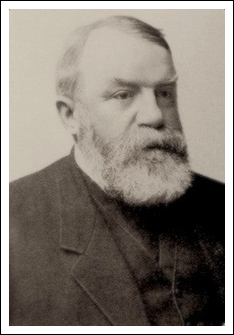 Eighty-six years ago (February 5, 1837), there was born of poor parents in a humble farmhouse in Northfield, Massachusetts, a little baby who was to become the greatest man, as I believe, of his generation or of his century — Dwight L. Moody. After our great generals, great statesmen, great scientists and great men of letters have passed away and been forgotten, and their work and its helpful influence has come to an end, the work of D. L. Moody will go on and its saving influence continue and increase, bringing blessing not only to every state in the Union but to every nation on earth. Yes, it will continue throughout the ages of eternity.
Eighty-six years ago (February 5, 1837), there was born of poor parents in a humble farmhouse in Northfield, Massachusetts, a little baby who was to become the greatest man, as I believe, of his generation or of his century — Dwight L. Moody. After our great generals, great statesmen, great scientists and great men of letters have passed away and been forgotten, and their work and its helpful influence has come to an end, the work of D. L. Moody will go on and its saving influence continue and increase, bringing blessing not only to every state in the Union but to every nation on earth. Yes, it will continue throughout the ages of eternity.
My subject is "Why God Used D. L. Moody," and I can think of no subject upon which I would rather speak. For I shall not seek to glorify Mr. Moody, but the God who by His grace, His entirely unmerited favor, used him so mightily, and the Christ who saved him by His atoning death and resurrection life, and the Holy Spirit who lived in him and wrought through him and who alone made him the mighty power that he was to this world. Furthermore: I hope to make it clear that the God who used D. L. Moody in his day is just as ready to use you and me, in this day, if we, on our part, do what D. L. Moody did, which was what made it possible for God to so abundantly use him.
The whole secret of why D. L. Moody was such a mightily used man you will find in Psalm 62:11: "God hath spoken once; twice have I heard this; that POWER BELONGETH UNTO GOD." I am glad it does. I am glad that power did not belong to D. L. Moody; I am glad that it did not belong to Charles G. Finney; I am glad that it did not belong to Martin Luther; I am glad that it did not belong to any other Christian man whom God has greatly used in this world’s history. Power belongs to God. If D. L. Moody had any power, and he had great power, he got it from God.
But God does not give His power arbitrarily. It is true that He gives it to whomsoever He will, but He wills to give it on certain conditions, which are clearly revealed in His Word; and D. L. Moody met those conditions and God made him the most wonderful preacher of his generation; yes, I think the most wonderful man of his generation.
But how was it that D. L. Moody had that power of God so wonderfully manifested in his life? Pondering this question, it seemed to me that there were seven things in the life of D. L. Moody that accounted for God’s using him so largely as He did.
1. A Fully Surrendered Man
The first thing that accounts for God’s using D. L. Moody so mightily was that he was a fully surrendered man. Every ounce of that two-hundred-and-eighty -pound body of his belonged to God; everything he was and everything he had, belonged wholly to God. Now, I am not saying that Mr. Moody was perfect; he was not. If I attempted to, I presume I could point out some defects in his character. It does not occur to me at this moment what they were; but I am confident that I could think of some, if I tried real hard. I have never yet met a perfect man, not one. I have known perfect men in the sense in which the Bible commands us to be perfect, i.e., men who are wholly God’s, out and out for God, fully surrendered to God, with no will but God’s will; but I have never known a man in whom I could not see some defects, some places where he might have been improved.
No, Mr. Moody was not a faultless man. If he had any flaws in his character, and he had, I presume I was in a position to know them better than almost any other man, because of my very close association with him in the later years of his life; and furthermore, I suppose that in his latter days he opened his heart to me more fully than to anyone else in the world. I think He told me some things that he told no one else. I presume I knew whatever defects there were in his character as well as anybody. But while I recognized such flaws, nevertheless, I know that he was a man who belonged wholly to God.
The first month I was in Chicago, we were having a talk about something upon which we very widely differed, and Mr. Moody turned to me very frankly and very kindly and said in defense of his own position: "Torrey, if I believed that God wanted me to jump out of that window, I would jump." I believe he would. If he thought God wanted him to do anything, he would do it. He belonged wholly, unreservedly, unqualifiedly, entirely, to God.
Henry Varley, a very intimate friend of Mr. Moody in the earlier days of his work, loved to tell how he once said to him: "It remains to be seen what God will do with a man who gives himself up wholly to Him." I am told that when Mr. Henry Varley said that, Mr. Moody said to himself: "Well, I will be that man." And I, for my part, do not think "it remains to be seen" what God will do with a man who gives himself up wholly to Him. I think it has been seen already in D. L. Moody.
If you and I are to be used in our sphere as D. L. Moody was used in his, we must put all that we have and all that we are in the hands of God, for Him to use as He will, to send us where He will, for God to do with us what He will, and we, on our part, to do everything God bids us do.
There are thousands and tens of thousands of men and women in Christian work, brilliant men and women, rarely gifted men and women, men and women who are making great sacrifices, men and women who have put all conscious sin out of their lives, yet who, nevertheless, have stopped short of absolute surrender to God, and therefore have stopped short of fullness of power. But Mr. Moody did not stop short of absolute surrender to God; he was a wholly surrendered man, and if you and I are to be used, you and I must be wholly surrendered men and women.
2. A Man of Prayer
The second secret of the great power exhibited in Mr. Moody’s life was that Mr. Moody was in the deepest and most meaningful sense a man of prayer. People oftentimes say to me: "Well, I went many miles to see and to hear D. L. Moody and he certainly was a wonderful preacher." Yes, D. L. Moody certainly was a wonderful preacher; taking it all in all, the most wonderful preacher I have ever heard, and it was a great privilege to hear him preach as he alone could preach; but out of a very intimate acquaintance with him I wish to testify that he was a far greater pray-er than he was preacher.
Time and time again, he was confronted by obstacles that seemed insurmountable, but he always knew the way to surmount and to overcome all difficulties. He knew the way to bring to pass anything that needed to be brought to pass. He knew and believed in the deepest depths of his soul that "nothing was too hard for the Lord" and that prayer could do anything that God could do.
Often times Mr. Moody would write me when he was about to undertake some new work, saying: "I am beginning work in such and such a place on such and such a day; I wish you would get the students together for a day of fasting and prayer" And often I have taken those letters and read them to the students in the lecture room and said: "Mr. Moody wants us to have a day of fasting and prayer, first for God’s blessing on our own souls and work, and then for God’s blessing on him and his work."
Often we were gathered in the lecture room far into the night — sometimes till one, two, three, four or even five o’clock in the morning, crying to God, just because Mr. Moody urged us to wait upon God until we received His blessing. How many men and women I have known whose lives and characters have been transformed by those nights of prayer and who have wrought mighty things in many lands because of those nights of prayer!
One day Mr. Moody drove up to my house at Northfield and said: "Torrey, I want you to take a ride with me." I got into the carriage and we drove out toward Lover’s Lane, talking about some great and unexpected difficulties that had arisen in regard to the work in Northfield and Chicago, and in connection with other work that was very dear to him.
As we drove along, some black storm clouds lay ahead of us, and then suddenly, as we were talking, it began to rain. He drove the horse into a shed near the entrance to Lover’s Lane to shelter the horse, and then laid the reins upon the dashboard and said: "Torrey, pray"; and then, as best I could, I prayed, while he in his heart joined me in prayer. And when my voice was silent, he began to pray. Oh, I wish you could have heard that prayer! I shall never forget it, so simple, so trustful, so definite and so direct and so mighty. When the storm was over and we drove back to town, the obstacles had been surmounted, and the work of the schools, and other work that was threatened, went on as it had never gone on before, and it has gone on until this day.
As we drove back, Mr. Moody said to me: "Torrey, we will let the other men do the talking and the criticizing, and we will stick to the work that God has given us to do, and let Him take care of the difficulties and answer the criticisms."
On one occasion Mr. Moody said to me in Chicago: "I have just found, to my surprise, that we are twenty thousand dollars behind in our finances for the work here and in Northfield, and we must have that twenty thousand dollars, and I am going to get it by prayer." He did not tell a soul who had the ability to give a penny of the twenty thousand dollars’ deficit, but looked right to God and said: "I need twenty thousand dollars for my work; send me that money in such a way that I will know it comes straight from Thee." And God heard that prayer. The money came in such a way that it was clear that it came from God in direct answer to prayer.
Yes, D. L. Moody was a man who believed in the God who answers prayer, and not only believed in Him in a theoretical way but believed in Him in a practical way. He was a man who met every difficulty that stood in his way — by prayer. Everything he undertook was backed up by prayer, and in everything, his ultimate dependence was upon God.
3. A Deep and Practical Student of the Bible
The third secret of Mr. Moody’s power, or the third reason why God used D. L. Moody, was because he was a deep and practical student of the Word of God. Nowadays it is often said of D. L. Moody that he was not a student. I wish to say that he was a student; most emphatically, he was a student. He was not a student of psychology; he was not a student of anthropology — I am very sure he would not have known what that word meant; he was not a student of biology; he was not a student of philosophy; he was not even a student of theology, in the technical sense of the term; but he was a student, a profound and practical student of the one Book that is more worth studying than all other books in the world put together; he was a student of the Bible.
Every day of his life, I have reason for believing, he arose very early in the morning to study the Word of God, way down to the close of his life. Mr. Moody used to rise about four o’clock in the morning to study the Bible. He would say to me: "If I am going to get in any study, I have got to get up before the other folks get up"; and he would shut himself up in a remote room in his house, alone with his God and his Bible.
I shall never forget the first night I spent in his home. He had invited me to take the superintendency of the Bible Institute and I had already begun my work; I was on my way to some city in the East to preside at the International Christian Workers’ Convention. He wrote me saying: "Just as soon as the Convention is over, come up to Northfield." He learned when I was likely to arrive and drove over to South Vernon to meet me. That night he had all the teachers from the Mount Hermon School and from the Northfield Seminary come together at the house to meet me, and to talk over the problems of the two schools. We talked together far on into the night, and then, after the principals and teachers of the schools had gone home, Mr. Moody and I talked together about the problems a while longer.
It was very late when I got to bed that night, but very early the next morning, about five o’clock, I heard a gentle tap on my door. Then I heard Mr. Moody’s voice whispering: "Torrey, are you up?" I happened to be; I do not always get up at that early hour but I happened to be up that particular morning. He said: "I want you to go somewhere with me," and I went down with him. Then I found out that he had already been up an hour or two in his room studying the Word of God.
Oh, you may talk about power; but, if you neglect the one Book that God has given you as the one instrument through which He imparts and exercises His power, you will not have it. You may read many books and go to many conventions and you may have your all-night prayer meetings to pray for the power of the Holy Ghost; but unless you keep in constant and close association with the one Book, the Bible, you will not have power. And if you ever had power, you will not maintain it except by the daily, earnest, intense study of that Book.
Ninety-nine Christians in every hundred are merely playing at Bible study; and therefore ninety-nine Christians in every hundred are mere weaklings, when they might be giants, both in their Christian life and in their service.
It was largely because of his thorough knowledge of the Bible, and his practical knowledge of the Bible, that Mr. Moody drew such immense crowds. On "Chicago Day," in October 1893, none of the theaters of Chicago dared to open because it was expected that everybody in Chicago would go on that day to the World’s Fair; and, in point of fact, something like four hundred thousand people did pass through the gates of the Fair that day. Everybody in Chicago was expected to be at that end of the city on that day. But Mr. Moody said to me: "Torrey, engage the Central Music Hall and announce meetings from nine o’clock in the morning till six o’clock at night." "Why," I replied, "Mr. Moody, nobody will be at this end of Chicago on that day; not even the theaters dare to open; everybody is going down to Jackson Park to the Fair; we cannot get anybody out on this day."
Mr. Moody replied: "You do as you are told"; and I did as I was told and engaged the Central Music Hall for continuous meetings from nine o’clock in the morning till six o’clock at night. But I did it with a heavy heart; I thought there would be poor audiences. I was on the program at noon that day. Being very busy in my office about the details of the campaign, I did not reach the Central Music Hall till almost noon. I thought I would have no trouble in getting in. But when I got almost to the Hall I found to my amazement that not only was it packed but the vestibule was packed and the steps were packed, and there was no getting anywhere near the door; and if I had not gone round and climbed in a back window they would have lost their speaker for that hour. But that would not have been of much importance, for the crowds had not gathered to hear me; it was the magic of Mr. Moody’s name that had drawn them. And why did they long to hear Mr. Moody? Because they knew that while he was not versed in many of the philosophies and fads and fancies of the day, he did know the one Book that this old world most longs to know — the Bible.
I shall never forget Moody’s last visit to Chicago. The ministers of Chicago had sent me to Cincinnati to invite him to come to Chicago and hold a meeting. In response to the invitation, Mr. Moody said to me: "If you will hire the Auditorium for weekday mornings and afternoons and have meetings at ten in the morning and three in the afternoon, I will go. " I replied: "Mr. Moody, you know what a busy city Chicago is, and how impossible it is for businessmen to get out at ten o’clock in the morning and three in the afternoon on working days. Will you not hold evening meetings and meetings on Sunday?" "No," he replied, "I am afraid if I did, I would interfere with the regular work of the churches."
I went back to Chicago and engaged the Auditorium, which at that time was the building having the largest seating capacity of any building in the city, seating in those days about seven thousand people; I announced weekday meetings, with Mr. Moody as the speaker, at ten o’clock in the mornings and three o’clock in the afternoons.
At once protests began to pour in upon me. One of them came from Marshall Field, at that time the business king of Chicago. "Mr. Torrey," Mr. Field wrote, "we businessmen of Chicago wish to hear Mr. Moody, and you know perfectly well how impossible it is for us to get out at ten o’clock in the morning and three o’clock in the afternoon; have evening meetings." I received many letters of a similar purport and wrote to Mr. Moody urging him to give us evening meetings. But Mr. Moody simply replied: "You do as you are told," and I did as I was told; that is the way I kept my job.
On the first morning of the meetings, I went down to the Auditorium about half an hour before the appointed time, but I went with much fear and apprehension; I thought the Auditorium would be nowhere nearly full. When I reached there, to my amazement I found a queue of people four abreast extending from the Congress Street entrance to Wabash Avenue, then a block north on Wabash Avenue, then a break to let traffic through, and then another block, and so on. I went in through the back door, and there were many clamoring for entrance there. When the doors were opened at the appointed time, we had a cordon of twenty policemen to keep back the crowd; but the crowd was so great that it swept the cordon of policemen off their feet and packed eight thousand people into the building before we could get the doors shut. And I think there were as many left on the outside as there were in the building. I do not think that anyone else in the world could have drawn such a crowd at such a time.
Why? Because though Mr. Moody knew little about science or philosophy or literature in general, he did know the one Book that this old world is perishing to know and longing to know; and this old world will flock to hear men who know the Bible and preach the Bible as they will flock to hear nothing else on earth.
During all the months of the World’s Fair in Chicago, no one could draw such crowds as Mr. Moody. Judging by the papers, one would have thought that the great religious event in Chicago at that time was the World’s Congress of Religions. One very gifted man of letters in the East was invited to speak at this Congress. He saw in this invitation the opportunity of his life and prepared his paper, the exact title of which I do not now recall, but it was something along the line of "New Light on the Old Doctrines." He prepared the paper with great care, and then sent it around to his most trusted and gifted friends for criticisms. These men sent it back to him with such emendations as they had to suggest. Then he rewrote the paper, incorporating as many of the suggestions and criticisms as seemed wise. Then he sent it around for further criticisms. Then he wrote the paper a third time, and had it, as he trusted, perfect. He went on to Chicago to meet this coveted opportunity of speaking at the World’s Congress of Religions.
It was at eleven o’clock on a Saturday morning (if I remember correctly) that he was to speak. He stood outside the door of the platform waiting for the great moment to arrive, and as the clock struck eleven he walked on to the platform to face a magnificent audience of eleven women and two men! But there was not a building anywhere in Chicago that would accommodate the very same day the crowds that would flock to hear Mr. Moody at any hour of the day or night.
Oh, men and women, if you wish to get an audience and wish to do that audience some good after you get them, study, study, STUDY the one Book, and preach, preach, PREACH the one Book, and teach, teach, TEACH the one Book, the Bible, the only Book that is God’s Word, and the only Book that has power to gather and hold and bless the crowds for any great length of time.
4. A Humble Man
The fourth reason why God continuously, through so many years, used D. L. Moody was because he was a humble man. I think D. L. Moody was the humblest man I ever knew in all my life. He loved to quote the words of another; "Faith gets the most; love works the most; but humility keeps the most. "
He himself had the humility that keeps everything it gets. As I have already said, he was the most humble man I ever knew, i.e., the most humble man when we bear in mind the great things that he did, and the praise that was lavished upon him. Oh, how he loved to put himself in the background and put other men in the foreground. How often he would stand on a platform with some of us little fellows seated behind him and as he spoke, he would say: "There are better men coming after me." As he said it, he would point back over his shoulder with his thumb to the "little fellows.” I do not know how he could believe it, but he really did believe that the others that were coming after him were really better than he was. He made no pretense to a humility he did not possess. In his heart of hearts, he constantly underestimated himself, and overestimated others.
He really believed that God would use other men in a larger measure than he had been used. Mr. Moody loved to keep himself in the background. At his conventions at Northfield, or anywhere else, he would push the other men to the front and, if he could, have them do all the preaching — McGregor, Campbell Morgan, Andrew Murray, and the rest of them. The only way we could get him to take any part in the program was to get up in the convention and move that we hear D. L. Moody at the next meeting. He continually put himself out of sight.
Oh, how many a man has been full of promise and God has used him, and then the man thought that he was the whole thing and God was compelled to set him aside! I believe more promising workers have gone on the rocks through self-sufficiency and self-esteem than through any other cause. I can look back for forty years, or more, and think of many men who are now wrecks or derelicts who at one time the world thought were going to be something great. But they have disappeared entirely from the public view. Why? Because of overestimation of self. Oh, the men and women who have been put aside because they began to think that they were somebody, that they were "IT," and therefore God was compelled to set them aside.
I remember a man with whom I was closely associated in a great movement in this country. We were having a most successful convention in Buffalo, and he was greatly elated. As we walked down the street together to one of the meetings one day, he said to me: "Torrey, you and I are the most important men in Christian work in this country," or words to that effect. I replied: "John, I am sorry to hear you say that; for as I read my Bible I find man after man who had accomplished great things whom God had to set aside because of his sense of his own importance." And God set that man aside also from that time. I think he is still living, but no one ever hears of him, or has heard of him for years.
God used D. L. Moody, I think, beyond any man of his day; but it made no difference how much God used him, he never was puffed up. One day, speaking to me of a great New York preacher, now dead, Mr. Moody said: "He once did a very foolish thing, the most foolish thing that I ever knew a man, ordinarily so wise as he was, to do. He came up to me at the close of a little talk I had given and said: ‘Young man, you have made a great address tonight.’" Then Mr. Moody continued: "How foolish of him to have said that! It almost turned my head." But, thank God, it did not turn his head, and even when pretty much all the ministers in England, Scotland and Ireland, and many of the English bishops were ready to follow D. L. Moody wherever he led, even then it never turned his head one bit. He would get down on his face before God, knowing he was human, and ask God to empty him of all self-sufficiency. And God did.
Oh, men and women! especially young men and young women, perhaps God is beginning to use you; very likely people are saying: "What a wonderful gift he has as a Bible teacher, what power he has as a preacher, for such a young man!" Listen: get down upon your face before God. I believe here lies one of the most dangerous snares of the Devil. When the Devil cannot discourage a man, he approaches him on another tack, which he knows is far worse in its results; he puffs him up by whispering in his ear: "You are the leading evangelist of the day. You are the man who will sweep everything before you. You are the coming man. You are the D. L. Moody of the day"; and if you listen to him, he will ruin you. The entire shore of the history of Christian workers is strewn with the wrecks of gallant vessels that were full of promise a few years ago, but these men became puffed up and were driven on the rocks by the wild winds of their own raging self-esteem.
5. His Entire Freedom from the Love of Money
The fifth secret of D. L. Moody’s continual power and usefulness was his entire freedom from the love of money. Mr. Moody might have been a wealthy man, but money had no charms for him. He loved to gather money for God’s work; he refused to accumulate money for himself. He told me during the World’s Fair that if he had taken, for himself, the royalties on the hymnbooks which he had published, they would have amounted, at that time, to a million dollars. But Mr. Moody refused to touch the money. He had a perfect right to take it, for he was responsible for the publication of the books and it was his money that went into the publication of the first of them.
Mr. Sankey had some hymns that he had taken with him to England and he wished to have them published. He went to a publisher (I think Morgan & Scott) and they declined to publish them, because, as they said, Philip Phillips had recently been over and published a hymnbook and it had not done well. However, Mr. Moody had a little money and he said that he would put it into the publication of these hymns in cheap form; and he did. The hymns had a most remarkable and unexpected sale; they were then published in book form and large profits accrued. The financial results were offered to Mr. Moody, but he refused to touch them. "But," it was urged on him, "the money belongs to you"; but he would not touch it.
Mr. Fleming H. Revell was at the time treasurer of the Chicago Avenue Church, commonly known as the Moody Tabernacle. Only the basement of this new church building had been completed, funds having been exhausted. Hearing of the hymnbook situation Mr. Revell suggested, in a letter to friends in London, that the money be given for completion of this building, and it was. Afterwards, so much money came in that it was given, by the committee into whose hands Mr. Moody put the matter, to various Christian enterprises.
In a certain city to which Mr. Moody went in the latter years of his life, and where I went with him, it was publicly announced that Mr. Moody would accept no money whatever for his services. Now, in point of fact, Mr. Moody was dependent, in a measure, upon what was given him at various services; but when this announcement was made, Mr. Moody said nothing, and left that city without a penny’s compensation for the hard work he did there; and, I think, he paid his own hotel bill. And yet a minister in that very city came out with an article in a paper, which I read, in which he told a fairy tale of the financial demands that Mr. Moody made upon them, which story I knew personally to be absolutely untrue. Millions of dollars passed into Mr. Moody hands, but they passed through; they did not stick to his fingers.
This is the point at which many an evangelist makes shipwreck, and his great work comes to an untimely end. The love of money on the part of some evangelists has done more to discredit evangelistic work in our day, and to lay many an evangelist on the shelf, than almost any other cause.
While I was away on my recent tour, I was told by one of the most reliable ministers in one of our eastern cities of a campaign conducted by one who has been greatly used in the past. (Do not imagine, for a moment, that I am speaking of Billy Sunday, for I am not; this same minister spoke in the highest terms of Mr. Sunday and of a campaign which he conducted in a city where this minister was a pastor.) This evangelist of whom I now speak came to a city for a united evangelistic campaign and was supported by fifty-three churches. The minister who told me about the matter was himself chairman of the Finance Committee.
The evangelist showed such a longing for money and so deliberately violated the agreement he had made before coming to the city and so insisted upon money being gathered for him in other ways than he had himself prescribed in the original contract, that this minister threatened to resign from the Finance Committee. He was, however, persuaded to remain to avoid a scandal. "As the total result of the three weeks’ campaign there were only twenty-four clear decisions," said my friend; "and after it was over the ministers got together and by a vote with but one dissenting voice, they agreed to send a letter to this evangelist telling him frankly that they were done with him and with his methods of evangelism forever, and that they felt it their duty to warn other cities against him and his methods and the results of his work." Let us lay the lesson to our hearts and take warning in time.
6. His Consuming Passion for the Salvation of the Lost
The sixth reason why God used D. L. Moody was because of his consuming passion for the salvation of the lost. Mr. Moody made the resolution, shortly after he himself was saved, that he would never let twenty-four hours pass over his head without speaking to at least one person about his soul. His was a very busy life, and sometimes he would forget his resolution until the last hour, and sometimes he would get out of bed, dress, go out and talk to someone about his soul in order that he might not let one day pass without having definitely told at least one of his fellow-mortals about his need and the Savior who could meet it.
One night Mr. Moody was going home from his place of business. It was very late, and it suddenly occurred to him that he had not spoken to one single person that day about accepting Christ. He said to himself: "Here’s a day lost. I have not spoken to anyone today and I shall not see anybody at this late hour." But as he walked up the street, he saw a man standing under a lamppost. The man was a perfect stranger to him, though it turned out afterwards the man knew who Mr. Moody was. He stepped up to this stranger and said: "Are you a Christian?" The man replied: "That is none of your business, whether I am a Christian or not. If you were not a sort of a preacher I would knock you into the gutter for your impertinence." Mr. Moody said a few earnest words and passed on.
The next day that man called upon one of Mr. Moody’s prominent business friends and said to him: "That man Moody of yours over on the North Side is doing more harm than he is good. He has got zeal without knowledge. He stepped up to me last night, a perfect stranger, and insulted me. He asked me if I were a Christian, and I told him it was none of his business and if he were not a sort of a preacher I would knock him into the gutter for his impertinence. He is doing more harm than he is good. He has got zeal without knowledge." Mr. Moody’s friend sent for him and said: "Moody, you are doing more harm than you are good; you’ve got zeal without knowledge: you insulted a friend of mine on the street last night. You went up to him, a perfect stranger, and asked him if he were a Christian, and he tells me if you had not been a sort of a preacher he would have knocked you into the gutter for your impertinence. You are doing more harm than you are good; you have got zeal without knowledge."
Mr. Moody went out of that man’s office somewhat crestfallen. He wondered if he were not doing more harm than he was good, if he really had zeal without knowledge. (Let me say, in passing, it is far better to have zeal without knowledge than it is to have knowledge without zeal. Some men and women are as full of knowledge as an egg is of meat; they are so deeply versed in Bible truth that they can sit in criticism on the preachers and give the preachers pointers, but they have so little zeal that they do not lead one soul to Christ in a whole year.)
Weeks passed by. One night Mr. Moody was in bed when he heard a tremendous pounding at his front door. He jumped out of bed and rushed to the door. He thought the house was on fire. He thought the man would break down the door. He opened the door and there stood this man. He said: "Mr. Moody, I have not had a good night’s sleep since that night you spoke to me under the lamppost, and I have come around at this unearthly hour of the night for you to tell me what I have to do to be saved." Mr. Moody took him in and told him what to do to be saved. Then he accepted Christ, and when the Civil War broke out, he went to the front and laid down his life fighting for his country.
Another night, Mr. Moody got home and had gone to bed before it occurred to him that he had not spoken to a soul that day about accepting Christ. "Well," he said to himself, "it is no good getting up now; there will be nobody on the street at this hour of the night." But he got up, dressed and went to the front door. It was pouring rain. "Oh," he said, "there will be no one out in this pouring rain. Just then, he heard the patter of a man’s feet as he came down the street, holding an umbrella over his head. Then Mr. Moody darted out and rushed up to the man and said: "May I share the shelter of your umbrella?" "Certainly," the man replied. Then Mr. Moody said: "Have you any shelter in the time of storm?" and preached Jesus to him. Oh, men and women, if we were as full of zeal for the salvation of souls as that, how long would it be before the whole country would be shaken by the power of a mighty, God-sent revival?
One day in Chicago — the day after the elder Carter Harrison was shot, when his body was lying in state in the City Hall — Mr. Moody and I were riding up Randolph Street together in a streetcar right alongside of the City Hall. The car could scarcely get through because of the enormous crowds waiting to get in and view the body of Mayor Harrison. As the car tried to push its way through the crowd, Mr. Moody turned to me and said: "Torrey, what does this mean?" "Why," I said, "Carter Harrison’s body lies there in the City Hall and these crowds are waiting to see it."
Then he said: "This will never do, to let these crowds get away from us without preaching to them; we must talk to them. You go and hire Hooley’s Opera House (which was just opposite the City Hall) for the whole day." I did so. The meetings began at nine o’clock in the morning, and we had one continuous service from that hour until six in the evening, to reach those crowds.
Mr. Moody was a man on fire for God. Not only was he always "on the job" himself but he was always getting others to work as well. He once invited me down to Northfield to spend a month there with the schools, speaking first to one school and then crossing the river to the other. I was obliged to use the ferry a great deal; it was before the present bridge was built at that point.
One day he said to me: "Torrey, did you know that that ferryman that ferries you across every day was unconverted?" He did not tell me to speak to him, but I knew what he meant. When some days later it was told him that the ferryman was saved, he was exceedingly happy.
Once, when walking down a certain street in Chicago, Mr. Moody stepped up to a man, a perfect stranger to him, and said: "Sir, are you a Christian?" "You mind your own business," was the reply. Mr. Moody replied: "This is my business." The man said, "Well, then, you must be Moody." Out in Chicago they used to call him in those early days "Crazy Moody," because day and night he was speaking to everybody he got a chance to speak to about being saved.
One time he was going to Milwaukee, and in the seat that he had chosen sat a traveling man. Mr. Moody sat down beside him and immediately began to talk with him. " Where are you going?" Mr. Moody asked. When told the name of the town he said: "We will soon be there; we’ll have to get down to business at once. Are you saved?" The man said that he was not, and Mr. Moody took out his Bible and there on the train showed him the way of salvation. Then he said: "Now, you must take Christ." The man did; he was converted right there on the train.
Most of you have heard, I presume, the story President Wilson used to tell about D. L. Moody. Ex-President Wilson said that he once went into a barber shop and took a chair next to the one in which D. L. Moody was sitting, though he did not know that Mr. Moody was there. He had not been in the chair very long before, as ex-President Wilson phrased it, he "knew there was a personality in the other chair," and he began to listen to the conversation going on; he heard Mr. Moody tell the barber about the Way of Life, and President Wilson said, "I have never forgotten that scene to this day." When Mr. Moody was gone, he asked the barber who he was; when he was told that it was D. L. Moody, President Wilson said: "It made an impression upon me I have not yet forgotten."
On one occasion in Chicago Mr. Moody saw a little girl standing on the street with a pail in her hand. He went up to her and invited her to his Sunday school, telling her what a pleasant place it was. She promised to go the following Sunday, but she did not do so. Mr. Moody watched for her for weeks, and then one day he saw her on the street again, at some distance from him. He started toward her, but she saw him too and started to run away. Mr. Moody followed her. Down she went one street, Mr. Moody after her; up she went another street, Mr. Moody after her, through an alley, Mr. Moody still following; out on another street, Mr. Moody after her; then she dashed into a saloon and Mr. Moody dashed after her. She ran out the back door and up a flight of stairs, Mr. Moody still following; she dashed into a room, Mr. Moody following; she threw herself under the bed and Mr. Moody reached under the bed and pulled her out by the foot, and led her to Christ.
He found that her mother was a widow who had once seen better circumstances, but had gone down until now she was living over this saloon. She had several children. Mr. Moody led the mother and all the family to Christ. Several of the children were prominent members of the Moody Church until they moved away, and afterwards became prominent in churches elsewhere. This particular child, whom he pulled from underneath the bed, was, when I was the pastor of the Moody Church, the wife of one of the most prominent officers in the church.
Only two or three years ago, as I came out of a ticket office in Memphis, Tennessee, a fine-looking young man followed me. He said: "Are you not Dr. Torrey?" I said, "Yes." He said: "I am so and so." He was the son of this woman. He was then a traveling man, and an officer in the church where he lived. When Mr. Moody pulled that little child out from under the bed by the foot he was pulling a whole family into the Kingdom of God, and eternity alone will reveal how many succeeding generations he was pulling into the Kingdom of God.
D. L. Moody’s consuming passion for souls was not for the souls of those who would be helpful to him in building up his work here or elsewhere; his love for souls knew no class limitations. He was no respecter of persons; it might be an earl or a duke or it might be an ignorant colored boy on the street; it was all the same to him; there was a soul to save and he did what lay in his power to save that soul.
A friend once told me that the first time he ever heard of Mr. Moody was when Mr. Reynolds of Peoria told him that he once found Mr. Moody sitting in one of the squatters’ shanties that used to be in that part of the city toward the lake, which was then called, "The Sands," with a colored boy on his knee, a tallow candle in one hand and a Bible in the other, and Mr. Moody was spelling out the words (for at that time the boy could not read very well) of certain verses of Scripture, in an attempt to lead that ignorant colored boy to Christ.
Oh, young men and women and all Christian workers, if you and I were on fire for souls like that, how long would it be before we had a revival? Suppose that tonight the fire of God falls and fills our hearts, a burning fire that will send us out all over the country, and across the water to China, Japan, India and Africa, to tell lost souls the way of salvation!
7. Definitely Endued with Power from on High
The seventh thing that was the secret of why God used D. L. Moody was that he had a very definite enduement with power from on High, a very clear and definite baptism with the Holy Ghost. Moody knew he had "the baptism with the Holy Ghost"; he had no doubt about it. In his early days he was a great hustler; he had a tremendous desire to do something, but he had no real power. He worked very largely in the energy of the flesh.
But there were two humble Free Methodist women who used to come over to his meetings in the Y.M.C.A. One was "Auntie Cook" and the other, Mrs. Snow. (I think her name was not Snow at that time.) These two women would come to Mr. Moody at the close of his meetings and say: "We are praying for you." Finally, Mr. Moody became somewhat nettled and said to them one night: "Why are you praying for me? Why don’t you pray for the unsaved?" They replied: "We are praying that you may get the power." Mr. Moody did not know what that meant, but he got to thinking about it, and then went to these women and said: "I wish you would tell me what you mean"; and they told him about the definite baptism with the Holy Ghost. Then he asked that he might pray with them and not they merely pray for him.
Auntie Cook once told me of the intense fervor with which Mr. Moody prayed on that occasion. She told me in words that I scarcely dare repeat, though I have never forgotten them. And he not only prayed with them, but he also prayed alone.
Not long after, one day on his way to England, he was walking up Wall Street in New York; (Mr. Moody very seldom told this and I almost hesitate to tell it) and in the midst of the bustle and hurry of that city his prayer was answered; the power of God fell upon him as he walked up the street and he had to hurry off to the house of a friend and ask that he might have a room by himself, and in that room he stayed alone for hours; and the Holy Ghost came upon him, filling his soul with such joy that at last he had to ask God to withhold His hand, lest he die on the spot from very joy. He went out from that place with the power of the Holy Ghost upon him, and when he got to London (partly through the prayers of a bedridden saint in Mr. Lessey’s church), the power of God wrought through him mightily in North London, and hundreds were added to the churches; and that was what led to his being invited over to the wonderful campaign that followed in later years.
Time and again Mr. Moody would come to me and say: "Torrey, I want you to preach on the baptism with the Holy Ghost." I do not know how many times he asked me to speak on that subject. Once, when I had been invited to preach in the Fifth Avenue Presbyterian Church, New York (invited at Mr. Moody’s suggestion; had it not been for his suggestion the invitation would never have been extended to me), just before I started for New York, Mr. Moody drove up to my house and said: "Torrey, they want you to preach at the Fifth Avenue Presbyterian Church in New York. It is a great big church, cost a million dollars to build it." Then he continued: "Torrey, I just want to ask one thing of you. I want to tell you what to preach about. You will preach that sermon of yours on ‘Ten Reasons Why I Believe the Bible to Be the Word of God’ and your sermon on ‘The Baptism With the Holy Ghost.’"
Time and again, when a call came to me to go off to some church, he would come up to me and say: "Now, Torrey, be sure and preach on the baptism with the Holy Ghost." I do not know how many times he said that to me. Once I asked him: "Mr. Moody, don’t you think I have any sermons but those two: ‘Ten Reasons Why I Believe the Bible to Be the Word of God’ and ‘The Baptism With the Holy Ghost’?" "Never mind that," he replied, "you give them those two sermons.
Once he had some teachers at Northfield — fine men, all of them, but they did not believe in a definite baptism with the Holy Ghost for the individual. They believed that every child of God was baptized with the Holy Ghost, and they did not believe in any special baptism with the Holy Ghost for the individual. Mr. Moody came to me and said: "Torrey, will you come up to my house after the meeting tonight and I will get those men to come, and I want you to talk this thing out with them."
Of course, I very readily consented, and Mr. Moody and I talked for a long time, but they did not altogether see eye to eye with us. And when they went, Mr. Moody signaled me to remain for a few moments. Mr. Moody sat there with his chin on his breast, as he so often sat when he was in deep thought; then he looked up and said: "Oh, why will they split hairs? Why don’t they see that this is just the one thing that they themselves need? They are good teachers, they are wonderful teachers, and I am so glad to have them here; but why will they not see that the baptism with the Holy Ghost is just the one touch that they themselves need?"
I shall never forget the eighth of July, 1894, to my dying day. It was the closing day of the Northfield Students’ Conference — the gathering of the students from the eastern colleges. Mr. Moody had asked me to preach on Saturday night and Sunday morning on the baptism with the Holy Ghost. On Saturday night I had spoken about, "The Baptism With the Holy Ghost: What It Is; What It Does; the Need of It and the Possibility of It." On Sunday morning I spoke on "The Baptism With the Holy Spirit: How to Get It." It was just exactly twelve o’clock when I finished my morning sermon, and I took out my watch and said: "Mr. Moody has invited us all to go up to the mountain at three o’clock this afternoon to pray for the power of the Holy Spirit. It is three hours to three o’clock. Some of you cannot wait three hours. You do not need to wait. Go to your rooms; go out into the woods; go to your tent; go anywhere where you can get alone with God and have this matter out with Him."
At three o’clock, we all gathered in front of Mr. Moody’s mother’s house (she was then still living), and then began to pass down the lane, through the gate, up on the mountainside. There were four hundred and fifty-six of us in all; I know the number because Paul Moody counted us as we passed through the gate.
After a while Mr. Moody said: "I don’t think we need to go any further; let us sit down here." We sat down on stumps and logs and on the ground. Mr. Moody said: "Have any of you students anything to say?" I think about seventy-five of them arose, one after the other, and said: "Mr. Moody, I could not wait till three o’clock; I have been alone with God since the morning service, and I believe I have a right to say that I have been baptized with the Holy Spirit."
When these testimonies were over, Mr. Moody said: "Young men, I can’t see any reason why we shouldn’t kneel down here right now and ask God that the Holy Ghost may fall upon us just as definitely as He fell upon the apostles on the Day of Pentecost. Let us pray." And we did pray, there on the mountainside. As we had gone up the mountainside heavy clouds had been gathering, and just as we began to pray, those clouds broke and the raindrops began to fall through the overhanging pines. But there was another cloud that had been gathering over Northfield for ten days, a cloud big with the mercy and grace and power of God; and as we began to pray, our prayers seemed to pierce that cloud and the Holy Ghost fell upon us. Men and women, that is what we all need: the Baptism with the Holy Ghost.
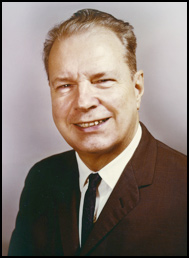 The following article by Gordon Lindsay is an excerpted chapter from his book, The Charismatic Ministry. It is reprinted here by permission from CHRIST FOR THE NATIONS. Founded in 1948 by Gordon and Freda Lindsay, CFNI continues to assist church builds by completing their roofs (over 12,000 completed), provides free literature (over 60 million in 81 languages), and assists in relief efforts (disasters, orphanages, prisons, hospitals). It prepares and trains world changers (over 35,000 graduates) and networks with CFN Associate Bible Schools (over 40 in 35 countries) to become part of the extreme generation that will go to the edge to evangelize the lost.
The following article by Gordon Lindsay is an excerpted chapter from his book, The Charismatic Ministry. It is reprinted here by permission from CHRIST FOR THE NATIONS. Founded in 1948 by Gordon and Freda Lindsay, CFNI continues to assist church builds by completing their roofs (over 12,000 completed), provides free literature (over 60 million in 81 languages), and assists in relief efforts (disasters, orphanages, prisons, hospitals). It prepares and trains world changers (over 35,000 graduates) and networks with CFN Associate Bible Schools (over 40 in 35 countries) to become part of the extreme generation that will go to the edge to evangelize the lost.
 The Danger of A Quick Success
The Danger of A Quick Success
 Eighty-six years ago (February 5, 1837), there was born of poor parents in a humble farmhouse in Northfield, Massachusetts, a little baby who was to become the greatest man, as I believe, of his generation or of his century — Dwight L. Moody. After our great generals, great statesmen, great scientists and great men of letters have passed away and been forgotten, and their work and its helpful influence has come to an end, the work of D. L. Moody will go on and its saving influence continue and increase, bringing blessing not only to every state in the Union but to every nation on earth. Yes, it will continue throughout the ages of eternity.
Eighty-six years ago (February 5, 1837), there was born of poor parents in a humble farmhouse in Northfield, Massachusetts, a little baby who was to become the greatest man, as I believe, of his generation or of his century — Dwight L. Moody. After our great generals, great statesmen, great scientists and great men of letters have passed away and been forgotten, and their work and its helpful influence has come to an end, the work of D. L. Moody will go on and its saving influence continue and increase, bringing blessing not only to every state in the Union but to every nation on earth. Yes, it will continue throughout the ages of eternity. The Westminster Shorter Catechism was completed in 1647 by the Westminster Assembly (London) and continues to serve as part of the doctrinal standards of many Presbyterian churches.
The Westminster Shorter Catechism was completed in 1647 by the Westminster Assembly (London) and continues to serve as part of the doctrinal standards of many Presbyterian churches. 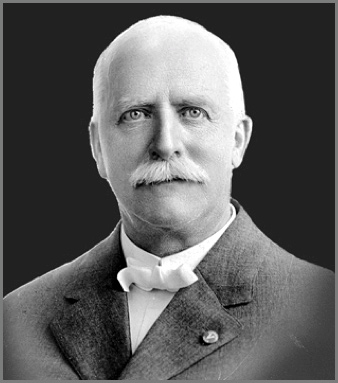 I was brought up to believe that the Bible was the Word of God. In early life I accepted it as such upon the authority of my parents, and never gave the question any serious thought. But later in life my faith in the Bible was utterly shattered through the influence of the writings of a very celebrated, scholarly and brilliant sceptic. I found myself face to face with the question, Why do you believe the Bible is the Word of God?
I was brought up to believe that the Bible was the Word of God. In early life I accepted it as such upon the authority of my parents, and never gave the question any serious thought. But later in life my faith in the Bible was utterly shattered through the influence of the writings of a very celebrated, scholarly and brilliant sceptic. I found myself face to face with the question, Why do you believe the Bible is the Word of God? –Their foot shall slide in due time.–
–Their foot shall slide in due time.– God grant me the serenity
God grant me the serenity 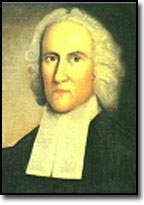 Being sensible that I am unable to do anything without God’s help, I do humbly entreat him by his grace to enable me to keep these Resolutions, so far as they are agreeable to his will, for Christ’s sake.
Being sensible that I am unable to do anything without God’s help, I do humbly entreat him by his grace to enable me to keep these Resolutions, so far as they are agreeable to his will, for Christ’s sake.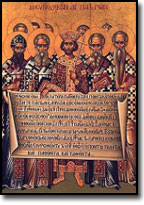 This creed was first formulated at the First Ecumenical Council, held at Nicea, located in what is now Turkey, in 325, as a response to the Arian heresy, which denied the divinity of Christ.
This creed was first formulated at the First Ecumenical Council, held at Nicea, located in what is now Turkey, in 325, as a response to the Arian heresy, which denied the divinity of Christ.
 On the last day, Jesus will say to those on His right hand, "Come, enter the Kingdom. For I was hungry and you gave me food, I was thirsty and you gave me drink, I was sick and you visited me." Then Jesus will turn to those on His left hand and say, "Depart from me because I was hungry and you did not feed me, I was thirsty and you did not give me drink, I was sick and you did not visit me." These will ask Him, "When did we see You hungry, or thirsty or sick and did not come to Your help?" And Jesus will answer them,
On the last day, Jesus will say to those on His right hand, "Come, enter the Kingdom. For I was hungry and you gave me food, I was thirsty and you gave me drink, I was sick and you visited me." Then Jesus will turn to those on His left hand and say, "Depart from me because I was hungry and you did not feed me, I was thirsty and you did not give me drink, I was sick and you did not visit me." These will ask Him, "When did we see You hungry, or thirsty or sick and did not come to Your help?" And Jesus will answer them,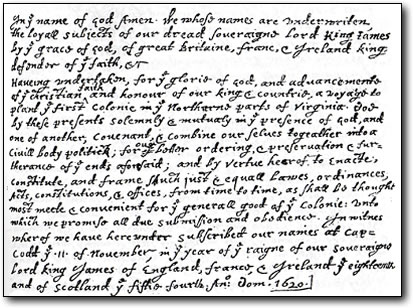
 Unless the divine power has raised you us to be as Athanasius contra mundum, I see not how you can go through your glorious enterprise in opposing that execrable villainy which is the scandal of religion, of England, and of human nature. Unless God has raised you up for this very thing, you will be worn out by the opposition of men and devils. But if God be fore you, who can be against you? Are all of them together stronger than God? O be not weary of well doing! Go on, in the name of God and in the power of his might, till even American slavery (the vilest that ever saw the sun) shall vanish away before it.
Unless the divine power has raised you us to be as Athanasius contra mundum, I see not how you can go through your glorious enterprise in opposing that execrable villainy which is the scandal of religion, of England, and of human nature. Unless God has raised you up for this very thing, you will be worn out by the opposition of men and devils. But if God be fore you, who can be against you? Are all of them together stronger than God? O be not weary of well doing! Go on, in the name of God and in the power of his might, till even American slavery (the vilest that ever saw the sun) shall vanish away before it.

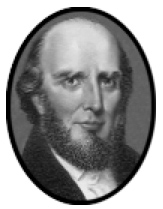 Preach on every doctrine that centers the attention on man rather than Jesus. Teach every doctrine that makes man the center of God’s attention rather than God the center of man’s devotion. Tell people only what God will do for them.
Preach on every doctrine that centers the attention on man rather than Jesus. Teach every doctrine that makes man the center of God’s attention rather than God the center of man’s devotion. Tell people only what God will do for them. 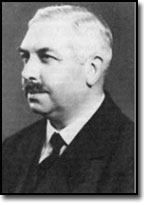
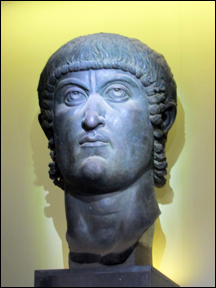 When I, Constantine Augustus, as well as I, Licinius Augustus, fortunately met near Mediolanum, and were considering everything that pertained to the public welfare and security, we thought among other things which we saw would be for the good of many, those regulations pertaining to the divinity ought certainly to be made first so that we might grant to the Christians and others full authority to observe that religion which each preferred; whence any divinity whatsoever in the seat of the heavens may be propitious and kindly disposed to us and all who are placed under our rule.
When I, Constantine Augustus, as well as I, Licinius Augustus, fortunately met near Mediolanum, and were considering everything that pertained to the public welfare and security, we thought among other things which we saw would be for the good of many, those regulations pertaining to the divinity ought certainly to be made first so that we might grant to the Christians and others full authority to observe that religion which each preferred; whence any divinity whatsoever in the seat of the heavens may be propitious and kindly disposed to us and all who are placed under our rule. 
